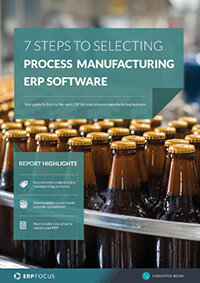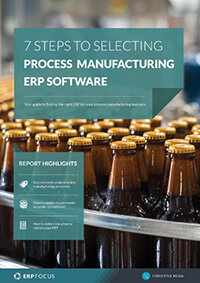Process Manufacturing ERP Requirements: Product Development
Like any business, process manufacturers need to develop new products and existing products. Often customers demand changes and improvements. The need might be to reduce cost or simplify manufacturing. Process manufacturing ERP is here to help regardless of the reason.
People have put on their thinking caps and produced ideas for some innovative finished product and all agree there is a marketplace demanding it and willing to pay large amounts of money right now. So what are we waiting for?
New Materials Planning
In the process manufacturing environment we probably start with new materials. We’ll bring in samples and open a project in the ERP system. The project is primarily a vehicle to capture costs and record the steps toward development of the product. A pharmaceutical manufacturer will use their quality system to list the steps taken to test the qualities of the materials and record the measurements. Specific batches will be used to record other ingredients mixed in and the production flows used. At the end, they will test again and measure the qualities of the finished materials comparing to expected results.
If we are a chemical manufacturer, we select a new material for our fertilizer. We need to source that material. Our suppliers are already in the purchasing module of the ERP. We can request quotes and eventually place a purchase order. Our ERP tracks the incoming order and a transaction will record the receipt and movement to inventory when it arrives. ERP also will let us know when the bill is due and we need to make a payment.
Packaging Requirements
ERP also helps with packaging requirements. Can we use existing pallet boxes? If we are producing flour and our customers are bakeries, this might be our situation. Is this a consumer product like cake icing that requires parts in inventory such as dispenser tubes and blister packaging? ERP helps us ensure the packaging is on hand when we are ready to ship to our market.
Product Stability
We will need to test and document the stability and shelf life of the new product. Our process manufacturing ERP is ready. We already monitor temperature and humidity in the warehouse. We can monitor other factors as needed. We can track the conditions on exactly the shelf where the product is stored. Over time, we will move product to the lab for testing and record the results in the ERP.
Compliance
Food, drug, and chemical producers are a process manufacturer and many products require compliance to regulation by external organizations. Again, our process manufacturing ERP is here to help. Our built-in analytical tools allow us to extract data from the ERP to provide whatever data is required by those organizations. ERP has captured transactional and test data all along and we only need to develop the proper query to meet this specific need.
Order Planning
At first we will produce small batches and we assume the batch size will need to grow to meet expected demands. No problem, our ERP capacity planning function can begin with a desired output quantity and plan backwards trough the recipe to let us know the quantity of each ingredient we need to start. As the batch size changes, the ingredient quantity changes and the non-linearity is no problem.
At the end, we can analyze our development project and learn from the results and help us to develop the next product even more effectively.
Free white paper

7 Steps to Selecting Process Manufacturing ERP
Your guide to finding the right ERP software for your process manufacturing business

Related articles
-

Three CRM features to look for in your next manufacturing ERP
ERP CRM modules can be very useful for manufacturers. Here's how to make the most of yours
-

CMMC Compliance: What Aerospace and Defense Manufacturers Need to Know
Key insights on CMMC compliance, deadlines, and securing DoD contracts with CMMC 2.0 certificatio...
-

Using your ERP to ensure quality control in your food manufacturing process
How your ERP can be used to ensure quality and compliance for your food manufacturing business

